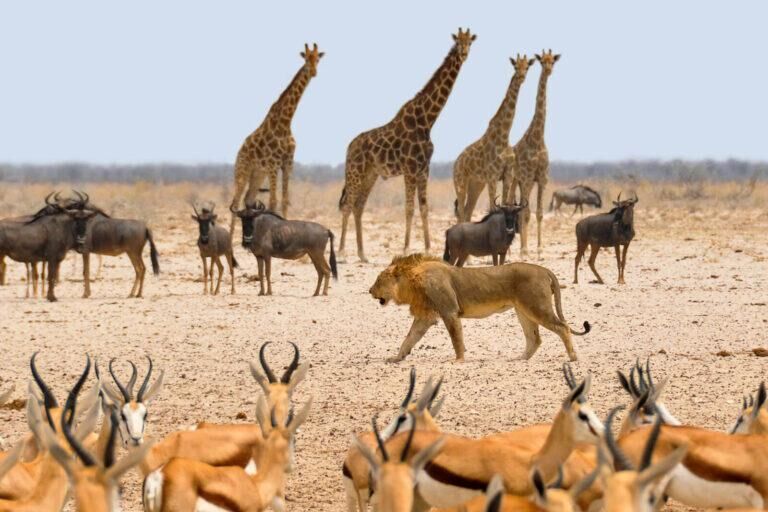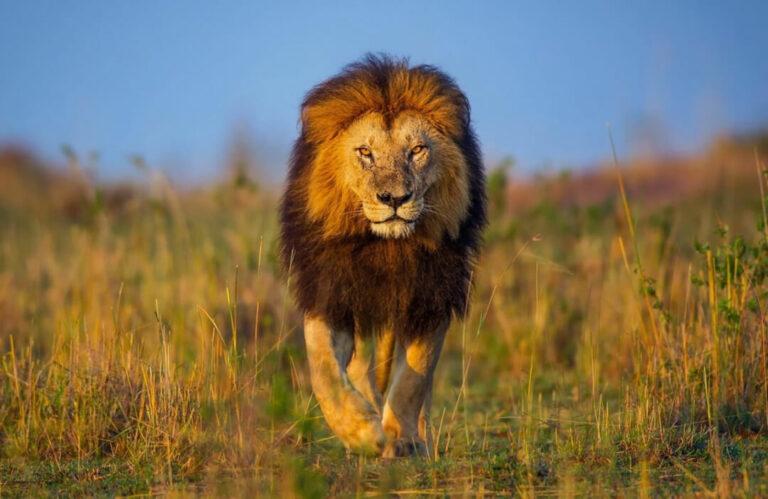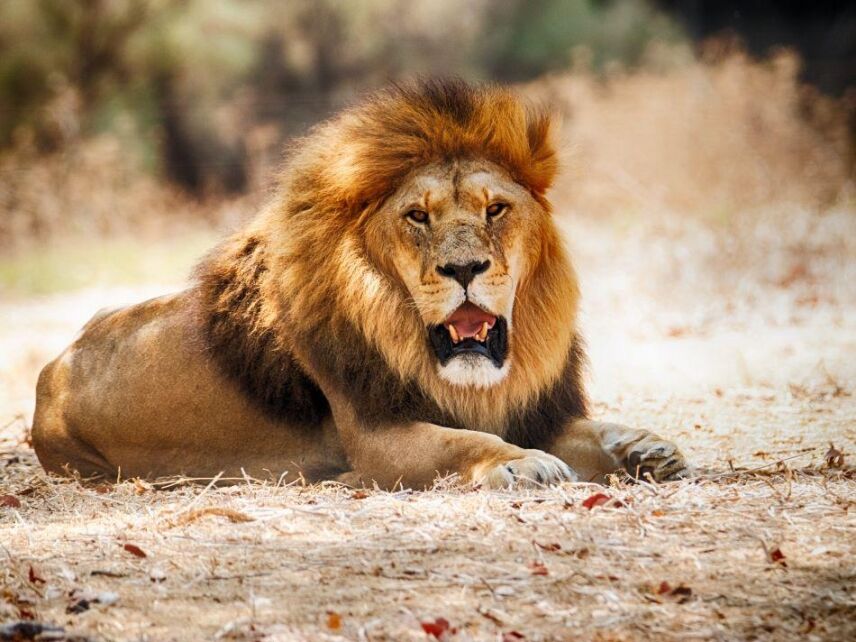The lion has been seen as the King of the Jungle since the dawn of time—a solid symbol of strength, pride, power, and even masculinity itself. The African continent is home to inspiring and challenging lion hunting safaris, regardless of the chosen destination.
Game hunting for the largest cat of the African big game is now seen as a true test and ultimate reward for a hunter’s efforts and skill.
[DYNAMIC-BLOGTABLEOFCONTENT]
The King of African Big Game – Why the Lion is seen as such a Prize
When it comes to game hunting in Africa, the biggest physical prize may be the elephant but the biggest by status is, undoubtedly, the lion. The lion hunting safari was originally brought about to control or eliminate problematic (read deadly) individuals of this African big game; the first legislation was drawn up in the mid-1600s.
Nowadays a lion hunting safari is seen as a test of a hunter’s skill, determination, and some would say wallet (lion hunts don’t come cheap!). The reward for a successful hunting adventure is a trophy of high status and one not to be found in common places.
Once a hunter has moved through the ranks and testing of other African safari hunting endeavors, the “boss level” test of taking on the King of Africa is no doubt a welcome challenge, and hopefully reward.

African Lion Hunting Safari Destinations: Country by Country
South Africa
Sunny SA has a year-round game hunting season, and its winter months are suggested for lion hunting safari due to the cooler temperatures and milder seasons. Of South Africa’s nine provinces, the North West and Limpopo provinces are known for producing most of South Africa’s lion hunting adventure; with the North West claiming up to 75% of South Africa’s lion hunting safari numbers.
Safari hunting for lions in South Africa requires the standard permit, relevant CITES tags (which can dictate hunt location), and any permits or licenses relevant to firearms. On the note of weapons, the legal minimum for African big game is .375, however, larger is recommended and the hunter needs to be completely comfortable with their weaponry to ensure a good shot. Bow hunting of lions in South Africa is legal and requires 500 grain, 60lb/ft. kinetic energy and 60lb draw mass.
Botswana
Botswana can be considered a prime property for the game hunting of lions due to its landscape. This southern African country is home to both the famous Kalahari Desert and the Okavango Delta. These regions provide lions with the best of both worlds: A drier, savannah-type habitat with grasses and brush, as well as an oasis of water and near guaranteed prey.
Hunt minimums and quotas are set by the land owners or concession holders and hunters require the standard hunting paperwork and permits, as well as CITES papers.
Zimbabwe
This southern African country doesn’t have a set safari hunting season, but like other African big game hunting destinations, the winter months are suggested as the best time to schedule your hunt. Game hunting areas can be government-controlled, tribal-owned, or on a private ranch. A lion hunting adventure can only take place on tribal or private land, as the practice is outlawed on government land/reserves. Lion hunts typically require a Zimbabwean government scout and the practice of night and artificial light hunting is allowed if granted permission by the landowner. Lion hunting safari in Zimbabwe are carried out through baiting only, and no hunting is allowed within 440 yards of a watering hole.

Namibia
Namibia is a country that can be described as a vast place of nothing. Sparsely populated and characterized by unending dunes, rolling desert, and patches of green, a lion hunting safari in Namibia will definitely put a hunter back in time to the glory days of this African big game.
Lion hunting safari in Namibia requires a special Predators Permit and these safari hunting trips are only allowed on government land or communal conservancy land. The majority of lion hunting safari in Namibia takes place in the Caprivi Strip, an area around 300 miles long and home to the rest of the Big 5, limited lion permits are issued due to the size of the area.
Zambia
Game hunting in Zambia is carried out in Game Management Areas or GMA’s; and like South Africa, there’s no set safari hunting season, rather hunts are booked and carried out depending on the arrival of the rainy seasons. Unlike Zimbabwe, night and artificial light hunting are illegal and all game hunting is limited to daylight hours.
Lion hunting safari can take place in GMA’s across the country depending on the populations, but the best areas are said to be Luangwa, Kafue, and Zambezi regions. Zambia’s minimum ammunition requirement is .300; but when trying to stop a beast of African big game, it’s wiser to go for something stronger.
Tanzania
A tropical country known as the mecca of game hunting in Africa. Dating back to the days of Theodore Roosevelt’s legendary lion hunting safari, Tanzania is known for producing if not the best lion hunting adventure on the continent.
Lion hunting safari requires a 21–day license, even if the advertised hunt is shorter, this is required by Tanzania game hunting law. Like other destinations, no night hunting or hunting from a vehicle is allowed and only lions over 6 years of age may be hunted. The Masailand and Selous areas are known for producing record lion trophies, while not taking the hunter too far from the main cities of Dar es Salaam and Arusha.
*It needs to be noted that the US, France, Netherlands, and Australia do not allow African lion trophies or product imports.
A Lion Hunting Adventure: Methods from which to choose and when to use them
Baiting
The baiting method in a lion hunting safari typically involves a bait of plains game (antelope, zebra, etc., or even buffalo) tied up and left in a known lion territory. Once activity on the bait is noted, a blind is constructed nearby, from here the hunter, PH, and guide (if necessary) will sit and wait for the lion to return. At this stage, one can determine if the trophy is of good quality or if it should be abandoned, in the case of it being a pregnant/nursing female.
Game hunting by baiting is sometimes the only method used depending on the hunt destination and these hunts are more commonly involved in fair chase safari hunting practices.
Stalking
The game hunting method of stalking is usually employed when hunting lions in a canned or captive setting. This involves tracking the animal either on foot or by getting a head start in the vehicle until tracks are spotted. From here the hunting adventure proceeds on foot until the target is found and the success of a shot determined.
In South Africa, due to regulation, only captive lions in an area of more than 1,000 hectares can be hunted by stalking and wild lion hunting safari requires a minimum of 15,000 hectares for baiting practices.
Shot Placement for this African Big Game Species
Lions, like other big cats, have their heart and lungs lying further back in the body than African plains animals. A shot placed just behind the front leg is in the good region of these vital organs. An uncommon shot is the one to the back; just above the join of the tail and the body, should the hunter approach from behind. A headshot requires placement around or between the eyes, a lion’s skull slopes back from this point and while the visual may seem good, you could end up shooting into the mane.
Learn more about shot placement on this African cat.
Canned vs Fair Chase Lion Hunting Safaris – What’s the Difference, and What’s the Big Deal?
Definitions
Fair chase
In its essence, fair chase game hunting is an ethical approach to safari hunting. Fair chase hunting describes game hunting in its most “natural” state.
An animal is hunted in an environment where it has the opportunity to evade or escape the hunter. There’s no containment and no risk of the animal being trapped or halted. Fair chase safari hunting is meant to be the most lawful and ethical manner of trophy hunting African big game. It’s about fairness and respect for the animal.
Fair chase game hunting is the ideal, the practice hunters have fought for and hopefully support to the fullest.
Canned
Conversely, a canned hunt is the opposite of a fair chase. Canned game hunting can be defined as keeping the trophy animal in an area or enclosure that prevents it from escaping or evading the hunter as it is within a large fenced area. Canned hunt animals are usually bred in captivity and never know the freedom of the wild. In the case of lion hunting safari, these targets start as cubs, bred for tourists to cuddle and snap photos with. From then they move into “natural” enclosures until they mature enough to be hunted. There are some cases where canned lions are drugged, captured, and then released into the safari hunting area before the hunt, but there are many reputable African outfitters who treat their animals well and ensure that they are well-cared for, ethically and morally.
In terms of “rewilding” captive lions for game hunting purposes, South African law stipulates a minimum 7-day period. However, some provinces do 30-day rewilding phases before the lion is set to be hunted.
Cost
Fair Chase
Fair chase lion hunting safari are some of the most expensive safari hunting opportunities found in Africa. They can range in price from $ 45,000 to $100,000 plus, this is due to their highly controlled and regulated nature with limited permits issued per game hunting season.
Canned
Captive lion hunting safaris are much cheaper as they are more widely available with less of a limit of quotas. Currently, captive lion hunting safari can be found online for between $3,000 and $15,000 depending on gender and trophy size.
This reduced cost is often the main driving factor in choosing this type of hunt.
Availability
Fair Chase
Fair chase lion hunts are available across Africa’s game hunting destinations but are regulated according to government quota which can (and often does) change from season to season. Countries can be limited to 40–60 trophies per safari hunting season depending on their lion populations.
Canned
Captive lion hunting safaris are more freely available and aren’t as regulated by quotas.
The Ethics of a Lion Hunting Safari
Game hunting to a certain degree is rooted in conservation efforts and sustainable measures intended to keep the safari hunting activity going for generations to come. However, the sport of game hunting is often seen as the devil and a reason for population decline in animals, lions or not. In any sphere of activity, you are bound to have those who take advantage of the grey areas and loopholes, and these actions often end up painting the whole group with the same brush.
Legal lion hunting safari is strictly regulated and controlled to best conserve populations and offer those taking on this African big game the best possible opportunity and experience. These safari hunting offers are made with the best interest of not only the animal population but also the human community in mind. The hunting adventure industry generates billions of dollars in economic revenue and supports thousands of jobs across the continent, both for those directly involved in the hunt and those in supporting roles; even those in the murky field of captive hunting.
Ethical issues related to game hunting can be wrestled with and argued till the end of time, but as with almost anything in life; as long as the rules are followed, it should be fair game (or fair chase). Written rules by government departments and controlling bodies are the main ones to be followed; but what about the unofficial, unwritten rules that come into play like:
- Respect the animal and the environment
- An accurate shot is a humane shot
- Respect the guidance of your PH, outfitter, or guide; especially if you’re in unknown territory
- Suffering is not a sign of success; a wounded animal needs to be tracked and a second clean shot taken
Game hunting may have evolved from its origins as a source of survival, but those same basic principles should be carried over into the sport safari hunting field.
At the end of the day; the hunter is the one who bears the moral weight, and as long as they can comfortably and proudly say that they upheld both official and unwritten laws, then they can consider their lion hunting safari a success. Game hunting of lion isn’t the big bad wolf, but it’s not perfect either, it needs consideration, thought, and discernment.
The right lion hunting safari is out there, are you ready to find it?
Author: A. Baker
